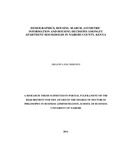| dc.description.abstract | The specific objectives of the study were: to ascertain if demographics have a significant
influence on housing decisions amongst households; to determine the mediating effect of
housing search on the influence of demographics on housing decisions amongst households;
to determine the moderating effect of asymmetric information on the influence of
demographics on housing decisions amongst households and to determine if the joint
influence of demographics, housing search and asymmetric information on housing decisions
amongst households was greater than the influence of demographics (singly) on such
decisions. Four hypotheses were formulated and each of them was operationalized into 4 subhypotheses.
The study was anchored on rational choice theory, efficient markets theory and
agency theory. Using cluster sampling, a sample of 226 households was contacted-199
responded. The study adopted the positivist research philosophy and a descriptive crosssectional
design. SPSS was used to analyze data using factor analysis, cross tabulation,
multiple regression analysis (standard) and hierarchical regression analysis. Tests conducted
include: Cronbach‟s Alpha (0.568), normality and linearity (using Shapiro-Wilk test and Q-Q
plots), multicollinearity (using correlation matrices, Tolerance and VIF), homogeneity of
variance (Levene test), sampling adequacy (KMO= 0.535), relationship between variables
(Bartlett‟s test of Sphericity). Study found that demographics overall had a significant
influence on choice of neighbourhood and choice of location of house; marital status was the
sole factor with a significant influence on source of financing; housing search and
asymmetric information had a mediating and moderating influence but their influence was
not statistically significant; the joint influence of demographics, housing search and
asymmetric information on the 4 housing decisions was greater than the influence of
demographics (singly) on all the 4 housing decisions. The study concluded that: the housing
market is efficient to the extent of the scope of this study or home buyers overly utilize
informal means of housing search; the market is not experiencing significant asymmetric
information problems; home buyers seem not to be utilizing market intermediaries to acquire
market information. The study recommended that: relevant housing, infrastructure and
development control departments at the National Government and County Government of
Nairobi should develop relevant housing laws to maintain high quality residential
neighbourhood; mortgage financiers to review their credit policy in view of buyer income
and marital status; mortgage financiers to focus mortgage lending to the married; property
developers to consider making convenient mortgage arrangements by partnering with key
players. The study contributes to knowledge since finance theory stands to gain since the
study explains how the study variables account for housing decisions; academicians will form
a basis for future study out of the research gaps identified by this study; physical search was
found to be popular. Limitations highlighted include: inability of descriptive cross-sectional
design to capture time effect; inability to extend research outcome to other settings besides
the study being restricted to only one county; having home owner as respondent for the
household; lack of similar studies from other counties in Kenya. Further studies should
consider longitudinal study of a similar nature; need for test of housing market efficiency; the
need for a causal study on marital status and source of financing and an exploratory study on
the factors accounting for source of financing; a study to investigate why the high mortgage
uptake amongst the apartment households contrary to empirical evidence from the
Kenyan housing market. | en_US |

